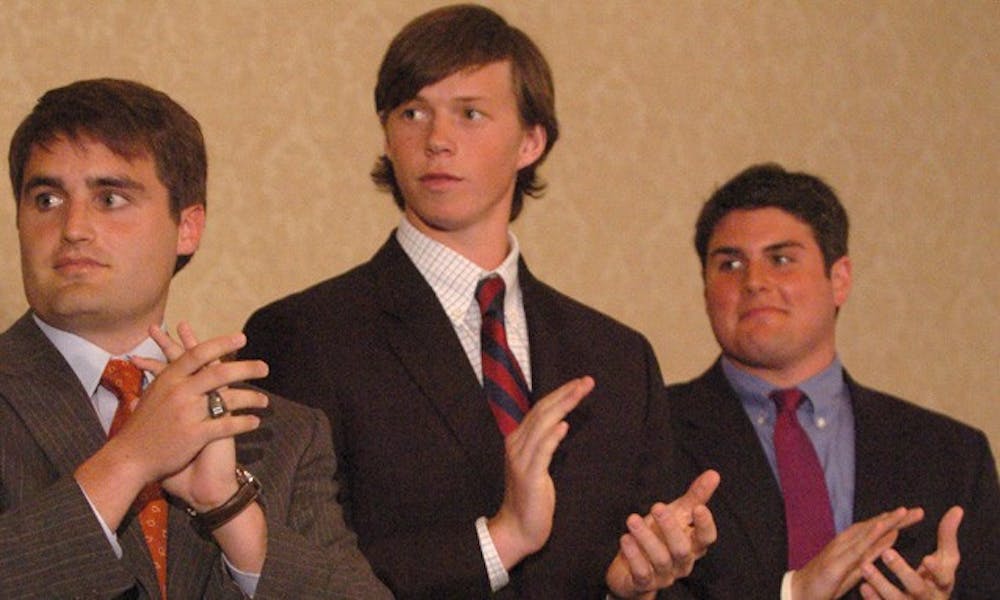Freshman move-in day might have been hot and sweaty for this year’s graduating seniors, but the national view of the campus they would soon call home was anything but sunny.
Pending allegations of rape, sexual assault and kidnapping against three lacrosse players, prompted the University to deal with the fallout of the lacrosse case and re-evaluate campus culture during the Class of 2010’s freshman year.
But the year was also marked by an expanding campus. In 2006, these freshmen were among the first to use the approximately $10 million, 40,000 sq.-foot West Campus Plaza. They also made use of the new labs and classrooms in the 280,000 sq.-ft. French Family Science Center, which opened in the Spring. The center was partially funded by a $30-million gift from the Bill and Melinda Gates Foundation, which played a large part in the changing campus that year.
The foundation donated $10 million to President Richard Brodhead’s Financial Aid Initiative, which hoped to raise $300 million for financial aid by the end of 2008. The initiative brought in more than $308 million by its deadline.
The University also increased the role civic engagement played in education at Duke when it launched DukeEngage in February 2007, which was funded in part by a $15 million gift from the foundation. Students would soon be able to spend a summer volunteering at sites across the world.
Back in Durham, students and administrators examined student life as part of the Campus Culture Initiative, a study Brodhead commissioned following the allegations against the lacrosse players.
The report—released in February after almost a year of meetings, studies and investigations—called for curriculum, alcohol policy and athletics changes, among other things. The committee promoted the existence of a diverse and inclusive community, called for more faculty-student interaction and asked for changes in housing and dining models to promote a stronger sense of community.
The lacrosse case also changed course. Questions arose about former Durham district attorney Mike Nifong’s handling of the case. The North Carolina State Bar accused Nifong of making numerous statements to the media condemning the players and of withholding DNA test results from defense lawyers.
Nifong dropped the rape charges against the indicted former players in December and turned the case over to North Carolina Attorney General Roy Cooper in January. In April, Cooper declared the former players innocent of all charges and criticized Nifong’s behavior.
Later that month, the 2006-2007 men’s lacrosse team made a symbolic comeback when it won the 2007 ACC Championship.
Other athletics teams, however, did not experience such success. After finishing 8-8 in the ACC regular season, the 2006-2007 men’s basketball team fell short in the NCAA Tournament, losing in the first round for the first time in 11 seasons. Crazies hoped for a different finish for the women’s team,but the team lost to Rutgers in the Sweet 16.
In April, former women’s basketball head coach Gail Goestenkors, who had been at Duke since 1992, announced her decision to leave the University to coach at the University of Texas. Later that month, the team learned that former Michigan State head coach Joanne P. McCallie would replace Goestenkors. The tradition of having a head coach with a one-letter nickname continued, as players referred to McCallie as “Coach P.”
The campus also experienced a change in dining. Compass Group replaced ARAMARK Corp. as the new dining management company on campus, and the Marketplace welcomed caterer Bon Appétit. Freshmen also received Duke Dining Durham Dollars—$50 gift cards students could use to purchase food at 19 different eateries in Durham.
It was a year of contrasts—in the midst of the widely-watched lacrosse case, Duke was growing in new ways, with programs like DukeEngage. Even though the University fell to eighth in the 2006 U.S. News and World Report rankings, its lowest undergraduate ranking since 2000, students were equipped with more facilities and ways of learning.
Although the lacrosse case would overshadow the Class of 2010’s first year at Duke, campus-wide re-evaluation in its aftermath attempted to shape the rest of the class’s Duke experience.
Get The Chronicle straight to your inbox
Signup for our weekly newsletter. Cancel at any time.

